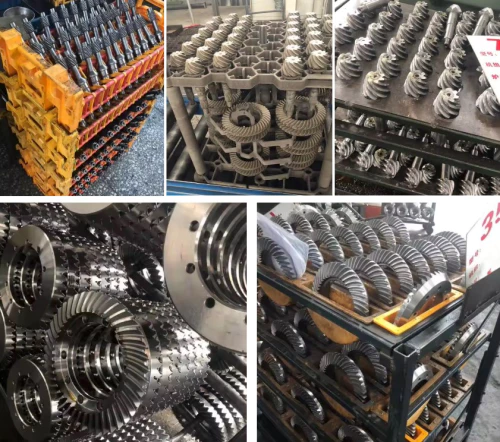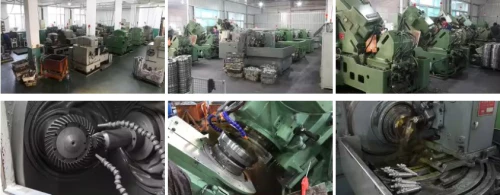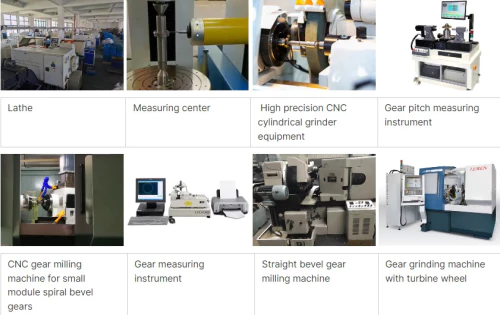How does the forging process impact the dimensional stability of bevel gears?
Forging bevel gears are a type of bevel gears that are manufactured through the forging process. Forging involves shaping metal through the application of localized compressive forces, typically using a die or hammer. In the case of bevel gears, the forging process is used to form the gear teeth and create the desired gear geometry.
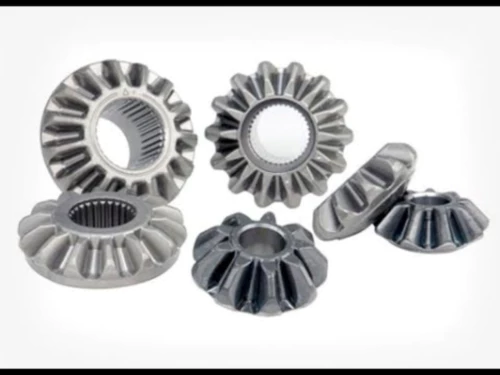
Advantages of Forging Bevel Gears
1. High Strength
Forging bevel gears exhibit high strength due to the grain structure refinement and improved material properties achieved through the forging process. This results in enhanced load-carrying capacity and durability.
2. Improved Fatigue Resistance
The forging process introduces compressive stresses into the material, which helps improve the fatigue resistance of bevel gears. This allows them to withstand repeated loading and prevent premature failure.
3. Precise Gear Tooth Geometry
Forging enables the production of bevel gears with precise gear tooth geometry, ensuring accurate and smooth gear meshing. This leads to improved efficiency and reduced noise and vibration.
4. Cost-Effectiveness
Forging bevel gears offer cost-effectiveness in terms of production volume. The ability to produce complex shapes in large quantities reduces manufacturing costs and increases overall efficiency.
5. Versatility in Material Selection
The forging process allows for the use of various materials, including alloy steels, stainless steels, and non-ferrous metals, providing flexibility in material selection based on specific application requirements.
6. Enhanced Structural Integrity
Forging enhances the structural integrity of bevel gears by eliminating defects and improving the material's density and strength. This results in gears with higher reliability and longer service life.
7. Tailored Mechanical Properties
By controlling the forging process parameters, the mechanical properties of bevel gears can be tailored to meet specific application demands, such as hardness, toughness, and wear resistance.
8. Reduced Lead Time
The forging process offers shorter lead times compared to other manufacturing methods. This allows for faster production and delivery of bevel gears, reducing overall project turnaround time.
9. Environmental Sustainability
Forging is a sustainable manufacturing process that produces minimal waste and reduces the need for additional machining operations. This contributes to a greener and more environmentally friendly production process.
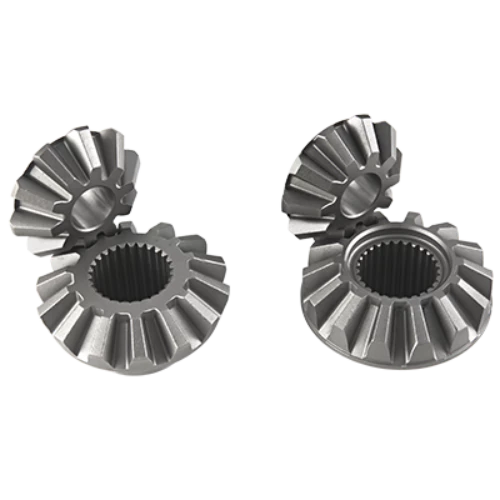
Working Principles of Forging Bevel Gears
Forging bevel gears operate based on the fundamental principles of gear mechanisms. They consist of two intersecting shafts, each with a conically shaped gear (bevel gear) mounted on it. The teeth of the bevel gears are designed to have a specific tooth profile, such as straight, spiral, or hypoid, depending on the application requirements.
When the input shaft rotates, the engagement of the teeth of the bevel gears causes a transfer of rotational motion and torque to the output shaft. The contact between the mating teeth ensures power transmission while maintaining proper alignment and smooth operation.
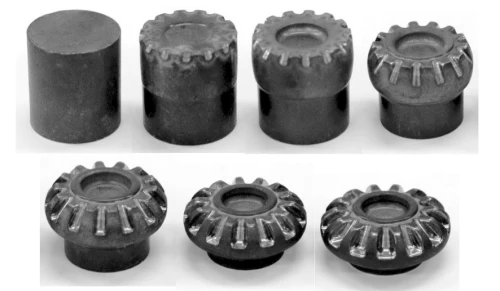
Applications of Forging Bevel Gears
Forging bevel gears find applications in various industries due to their excellent performance and reliability. Some of the key applications include:
1. Automotive Industry
Forging bevel gears are extensively used in automotive transmissions, drivetrains, and differential systems. They enable smooth power transmission and efficient torque delivery.
2. Industrial Machinery
Forging bevel gears are employed in various industrial machinery applications, such as heavy-duty equipment, machine tools, and gearboxes, due to their strength, precision, and durability.
3. Aerospace and Defense
In the aerospace and defense sector, forging bevel gears are utilized in aircraft engines, helicopters, missiles, and military vehicles, where high strength and reliability are crucial.
4. Renewable Energy
Forging bevel gears play a vital role in wind turbines, solar trackers, and hydroelectric systems. They ensure efficient power generation and withstand harsh operating conditions.
5. Marine and Shipbuilding
Marine and shipbuilding applications, such as propellers, rudders, and steering systems, benefit from the superior strength and corrosion resistance provided by forging bevel gears.
6. Agricultural Machinery
Agricultural machinery, including tractors, combines, and harvesters, rely on forging bevel gears for their high torque transmission and ability to withstand demanding field conditions.
7. Power Generation
In power generation plants, forging bevel gears are used in turbine generators, boilers, and other equipment, ensuring efficient energy production and reliable operation.
8. Robotics and Automation
Forging bevel gears find application in robotics and automation systems, enabling precise motion control and efficient power transmission in various robotic and automated processes.
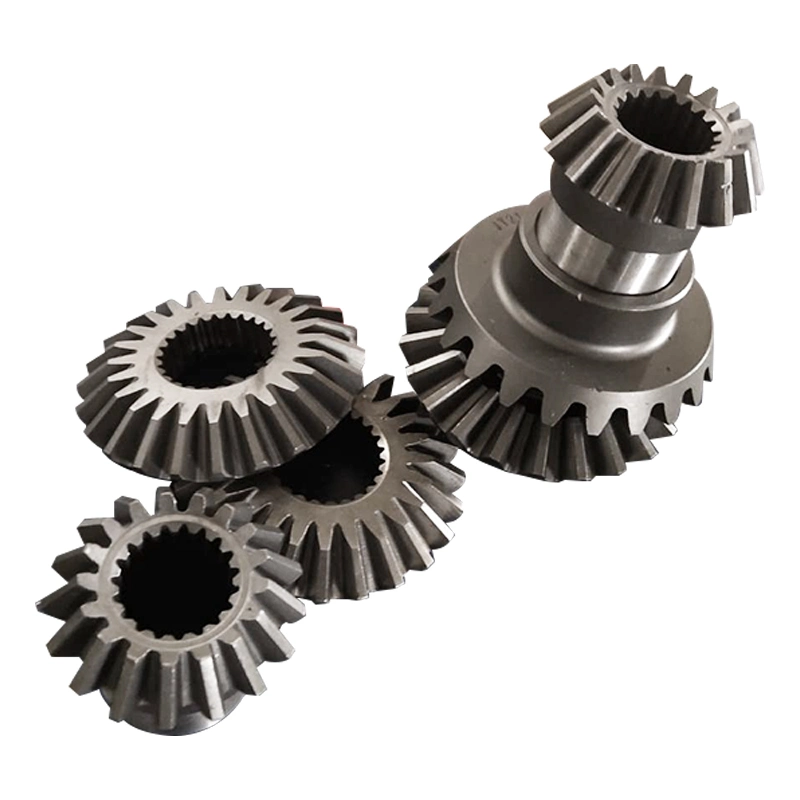
Installation and Maintenance of Forging Bevel Gears
Proper installation and maintenance are essential for ensuring the optimal performance and longevity of forging bevel gears.
Installation:
- Proper Alignment: Ensuring accurate alignment of the shafts and gears for efficient power transmission.
- Lubrication: Applying suitable lubricants to reduce friction and wear between gear teeth.
- Mounting Bolts: Using appropriate mounting bolts and ensuring proper torque to maintain gear integrity.
- Inspection: Conducting thorough inspections to verify gear alignment, tooth contact, and overall installation quality.
Maintenance:
- Lubrication: Regularly lubricating the gears to minimize friction and prevent premature wear.
- Cleaning: Keeping the gears clean from debris and contaminants to maintain optimal performance.
- Inspection: Periodically inspecting the gears for wear, damage, or signs of failure.
- Replacements: Promptly replacing any worn-out or damaged gears to prevent further damage to the system.
- Gearbox Maintenance: Ensuring proper maintenance and servicing of the gearbox housing the bevel gears.
- Load Monitoring: Monitoring the applied load to prevent overloading or excessive stress on the gears.
- Training and Expertise: Providing necessary training to maintenance personnel for effective gear maintenance.
- Record-Keeping: Maintaining detailed records of inspections, maintenance activities, and gear replacements for future reference.
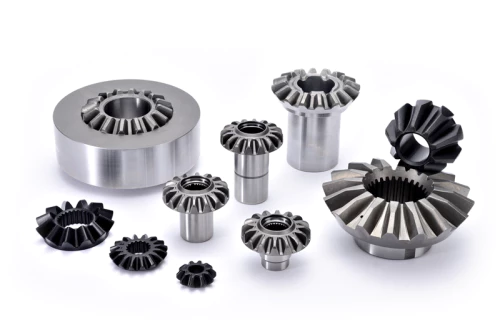
How to Select the Right Forging Bevel Gear
Selecting the appropriate forging bevel gear involves considering several factors to ensure optimal performance and compatibility with the intended application:
1. Application Requirements
Understanding the specific operational requirements such as torque, speed, and environmental conditions to select a gear with suitable characteristics.
2. Design and Specifications
Considering the gear's design features, dimensions, and specifications to ensure proper fit and function within the system.
3. Material Selection
Choosing the right material based on factors such as strength, corrosion resistance, and temperature resistance to meet the application demands.
4. Quality and Reliability
Evaluating the quality and reliability of the gear manufacturer to ensure consistent performance and long-term reliability.
5. Load-Carrying Capacity
Determining the gear's load-carrying capacity to ensure it can withstand the expected operating loads without failure.
6. Efficiency and Performance
Assessing the gear's efficiency and performance characteristics to optimize power transmission and minimize energy losses.
7. Customization and Adaptability
Considering the manufacturer's ability to provide customized gears or adapt existing designs to meet specific application requirements.
8. Cost Considerations
Balancing the gear's performance and quality with the overall project budget and cost constraints.
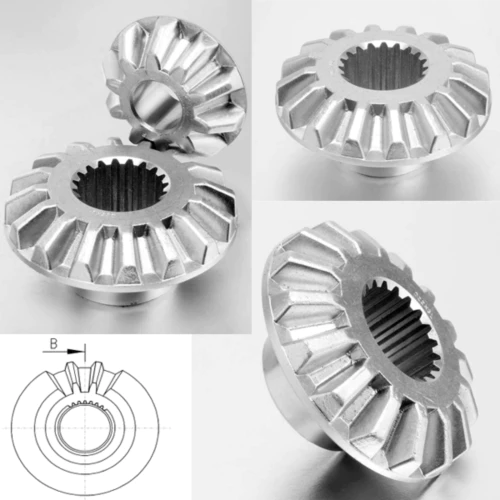
Featured Company: Shaoxing Chaoli
Shaoxing Chaoli is a professional manufacturer of gears in China. With products exported to countries such as Spain, the Netherlands, the United States, South Korea, Turkey, and Russia, Shaoxing Chaoli aims to help customers develop new products and solve technical and quality problems.
The company prioritizes high-quality products, fair prices, and perfect services, adhering to the principles of quality first, timely delivery, and credit first. Shaoxing Chaoli welcomes business partners to cooperate and create brilliance together.
In addition to forging bevel gears, Shaoxing Chaoli offers other gear products such as Worm Gear, spiral bevel gear, Helical Gear, Spur Gear, plastic gear, metric gear rack, and more. Customers are welcome to inquire about customized products.
Shaoxing Chaoli has a strong presence in the industry, serving hundreds of fixed suppliers including domestic steel rolling mills, shipyards, precision machine tool factories, automation machinery factories, and distribution companies. Their products are exported to Western Europe, the Middle East, Southeast Asia, and other regions.
With hundreds of employees, including many engineers, Shaoxing Chaoli possesses fixed assets of 20 million yuan and an annual output value of 50 million yuan. The company is equipped with a complete set of strict quality management systems and precision measuring instruments to ensure product quality.
